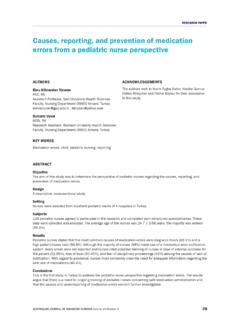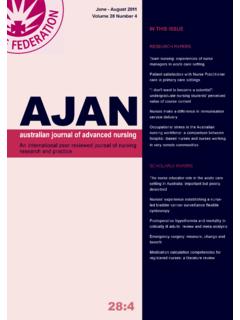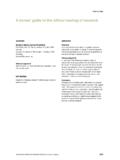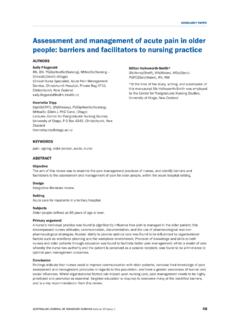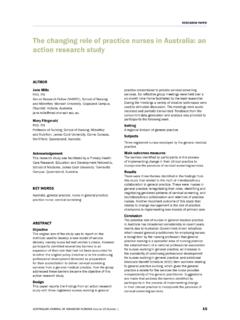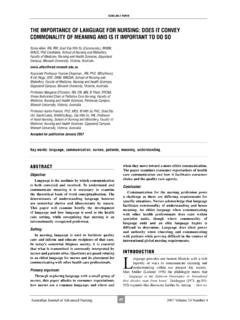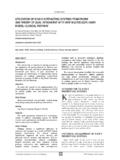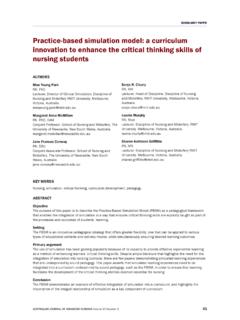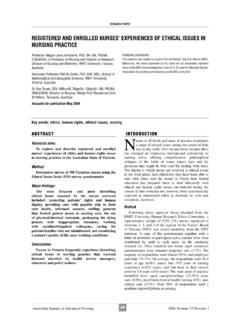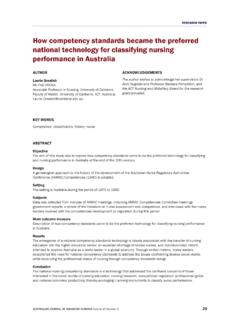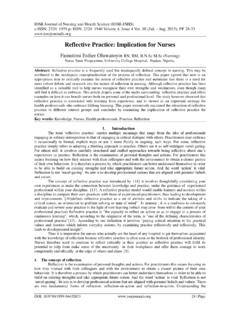Transcription of Changing philosophies: a paradigmatic nursing shift from ...
1 AUSTRALIAN JOURNAL OF ADVANCED nursing Volume 31 Number 136 SCHOLARLY PAPERC hanging philosophies : a paradigmatic nursing shift from Nightingale AUTHORP hilip J WarelowRN, PhD Senior Lecturer, School of Health Sciences nursing , University of Ballarat, Mt Helen, Victoria, Australia WORDSnon positivist, received view, positivist, perceived view, theoretical construction, nursing consider the Changing philosophical and theoretical construction of nursing which has moved from an initial focus on positivism and science, and undergone a paradigmatic shift so that it is now being interpreted by some nursing theorists in alternative ways. Primary ArgumentA theoretical review of some nursing theorists and a critical consideration of the wider concepts which have been influential in theoretical constructions gradually moving from the received (positivistic) to the perceived view. The perceived view encompasses the emergence and influence of non-positivist philosophies , which shift the theoretical focus away from causation to a more interpretive, unscientific standpoint, with foundations in phenomenology, humanism, holistic care and qualitative research.
2 The paper demonstrates that many of the theories offered are esoteric, complicated and constructed in an academic way that tends to escape the everyday nurse practitioner. ConclusionThat multiple options which capture the philosophies and ideologies of both paradigms should/could be JOURNAL OF ADVANCED nursing Volume 31 Number 137 SCHOLARLY PAPERINTRODUCTIONThis paper examines the influence of non-positivist philosophies on the theoretical construction and practice of nursing . In tracing this influence the work and philosophical assumptions of some nursing theorists are critically examined, questioning the relationship between their theories and the intellectual, socio cultural, and developmental contexts in which their ideas arose. This examination demonstrates the major intellectual and socio-political influences on which specific nursing theorists draw, and place their nursing theories in a wider context showing that the movement away from positivist philosophies enables them to be more clearly understood and used in clinical nursing practice into the 21st term positivist recognises observable phenomena and facts, whereby knowledge is derived from experience.
3 Holmes (1990) refers to positivism as a general orientation according to which the world can only be known through observable entities, with demonstrated regularities and general laws verified through their measurement and quantification. Non-positivist philosophies take an alternative stance to the scientific method, with this alternative view shifting the focus from causation and measurement to a more qualitative, unscientific, and interpretive, standpoint, with its foundations in phenomenology, humanism, and holistic care. These new views find favour across a broad range of theoretical publications (Meleis 2012; Reed et al 2004; Blattner 1981). Holmes (1990) and Martin (2000) support this alternative by describing the term verstehen as a Neo Kantian view which promotes understanding gained through empathic imagination, as opposed to objective knowledge gained through observation. Verstehen explanations aim not to give causal explanations (as in positivism) but to deepen and extend one s understandings about why social life is perceived and experienced as it is.
4 Verstehen is a German term meaning understanding or comprehension. However, in late nineteenth century German academic circles it came to be associated with the view that social phenomena have to be understood from within. This approach to social inquiry tended to be qualitative rather than quantitative and was opposed by positivists who stressed external, experimental and quantitative knowledge. Although this position has been modified over time, the dispute between positivists and non-positivists has persisted and still defines many of the theoretical debates in the field today. Positivism is no longer as popular, with this view and way of knowing being seen as indefensible by many contemporary philosophers of social science. Instead of appealing to verstehen in describing their preferred approach, anti positivists today speak about interpreting meaning or hermeneutical understanding (Martin 2000). These alternative views have found some favour in nursing and are arguably more readily applied across clinical situations as nursing groups seek particular understandings and appear more comfortable with philosophical concepts which incorporate a more postmodern humanism/holistic basis to their FOCUSC arper s (1978) analysis which questioned the need for such a narrow theoretical focus on the empirical method identified four patterns of knowing in nursing : 1) empirics, the science; 2) aesthetics, the art; 3) personal knowledge; 4) ethics, moral knowledge.
5 Carper (1978) clearly felt that none of these patterns alone should be considered sufficient, suggesting that the teaching, learning and application of one pattern should not require the rejection/neglect of any of the others. Carper s typology set the scene for significant future epistemological movement and change by acting as a catalyst or bridge by alerting nurses that science alone will not answer the significant questions in our discipline. A multi paradigmatic view is consistent with the position taken later by Sarvim ki (1988), who depicted nursing as a moral, practical and creative co action, highlighting the role of nurses as having meaning in AUSTRALIAN JOURNAL OF ADVANCED nursing Volume 31 Number 138 SCHOLARLY PAPER respect to other people and that this should be the starting point of all nursing action and be used as its theoretical foundation. These thoughts reflect Habermas (1981a, 1981b) work on theories of communicative action, and supports his notion of knowledge as an outcome of activity in which humans engage because of a natural need or interest.
6 This suggests an acceptance of knowledge derived from a holistic and humanistic perspective. These views are compatible with nursing being seen as an art form rather than a science, and a focus for many contemporary nursing theorists (Chinn and Kramer 1991; King 1981). Nolan et al (1998) notes the need for separate disciplines to have their own theories, Holmes (1991) decries the positivist (empirical), scientific method of nursing s theoretical basis, as being analytic, mechanistic and reactive, concentrating like medical science on the illness cure paradigm, and instead champions a more humanistic, person centred method, highlighting its dialogical, interactive and holistic and human perspective within the health care paradigm. This paradigm is favoured by nursing scholars/theorists where emphasis is directed toward concepts such as empathy, rapport, intuition, personal meanings and therapeutic relationships (Benner and Wrubel 1989; Travelbee 1966; Peplau 1952).
7 This would require university based nursing programs to take a more interpretive or postmodern view of these values (Meleis 2012). In so doing students will therefore be exposed to a multiplicity of theoretical positions. As healthcare moves towards adopting multidisciplinary approaches to practice, nursing continues to strive to establish its own unique body of knowledge and to maintain its professional boundaries. This issue is blurred further because the boundaries between nursing , medicine and other discipline specific roles are never static with nurses increasingly extending their scope of practice and occupying discipline specific status in university programs and have begun to perform clinical tasks previously carried out by doctors with many of their own traditional roles being passed on to healthcare assistants. nursing theory development plays a significant role for clinical practice as it retains a close linkage to research, and therefore, integration to practice is much more positive in the sense that the linkage to research provides solid grounds for further evidence based theoretical development and the specifics will help facilitate and strengthen the linkages between theories, research and practice (Im and Chang 2012).
8 RECEIVED TO PERCEIVEDThe dichotomy between science and humanism (Meleis 2007) suggests that the guiding paradigm for nursing practice has been the received view, described as a label for empirical positivism, which amalgamates logic with the goals of empiricism in the development of scientific theories. The received view signifies a set of ideas that are not challenged, suggesting these ideas had almost been reified or set in stone (Meleis 2012). The received view has reductionism, objectivity, measurement, quantification and validity as central building blocks (reflected within the medical model) are task oriented and which still strongly influence the manner in which nursing care and practice has been theorised. Science in this sense is considered as value free and most positivists regard traditional metaphysics and ethical considerations as relatively unimportant with non positivist investigation being considered emotive and as being cognitively meaningless (Meleis 2012).
9 On this basis, nursing s progress in theoretical development which has relied on the received scientific view has made slow progress and its development perhaps seen as the poor cousin to other academic disciplines such as medicine and science. This progress and reliance by nursing on reducing a problem to its smallest part and stripping it of its contextual background and taking away its humanistic life perspectives hints at reductionism. This model often means that how the problem emanated has been discounted and treating the symptoms rather than the underlying problem and has meant that nursing often struggles in developing meaningful theories and this has got in the way of nursing s AUSTRALIAN JOURNAL OF ADVANCED nursing Volume 31 Number 139 SCHOLARLY PAPER aspirational goals of being a scientific discipline. That being said, nursing is working hard at fostering the development of more meaningful theory and promoting a move toward non or post positivistic theory, which Meleis (2012) calls the perceived perceived view bases the theoretical constructions of nursing around alternative methods, which accept values, subjectivity, intuition, history, tradition and multiple realities although does retain some scientific knowledge and broadly harnesses this by calling it evidence based practice, itself highly contentious in nursing and for traditional science (Meleis 2012).
10 This view extends the positivist medical model and is more congruent with nursing containing a caring commitment to human beings and treating the person with the illness rather than just the diagnosis/pathology. The emergence of postmodernism and some of the literature, like the post modernistic movement as a whole, tends to challenge or reject the principles, dogma and practices of established modernism. The emergence of postmodernism as a movement tends to encompass what I have described as the paradigm shift from the received to perceived view whereby nursing as a profession is now looking to move away or deconstruct from singular theoretical constructions of nursing and how these constructions determine the care nurses give and govern their overall philosophy of nursing . Indeed, the convergence of postmodern literature with various modes of critical theory and deconstructionist approaches, and the subversions of the implicit contract between the author, the text and the reader s understandings have come to characterise its theoretical construction and therefore its application to practice.
